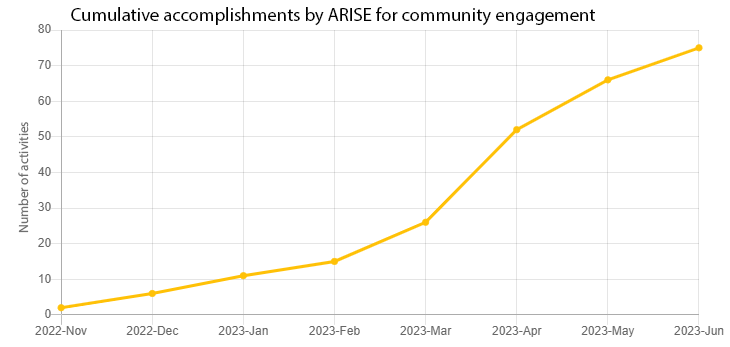
With extreme weather events on the rise, a team of Kansas scientists aims to bolster resilience across the state. But rather than looking for answers just in the lab—this team is co-creating solutions with Kansas communities.
“The community is not a bystander to this research,” said Jason Bergtold, professor of agricultural economics at Kansas State University and a scientist on the team, which is called ARISE for Adaptive and Resilient Infrastructures driven by Social Equity.
Since its launch in 2022, the ARISE team has nurtured partnerships with local communities in five Kansas counties (Ford, Finney, Johnson, Seward, and Wyandotte) to advance its research. These partners play a key role in guiding the research toward practical, equitable outcomes.
“One of the things that is really important to us in this project is communities,” said Dr. Bergtold. “For us to be successful…we are looking for partners that we can work with. And that doesn’t just mean a utility company for infrastructure. It’s working with civic organizations, residents, businesses, community colleges, and so on.”
Just as scientists are experts in their fields, the people who live in a particular town are experts of their own local realities. Finding solutions to complex challenges like resilience takes both types of knowledge.
“The meaning of resilience and social equity differ across communities and organizations,” said Elaina Sutley, associate professor of civil, environmental, and architectural engineering at the University of Kansas. “That’s why it is so important for us to engage with [various] organizations and households, so we can make sure we learn holistically from their diverse perspectives.”
“The worst thing we can do is come in from the outside and tell a community what to do,” said Dr. Bergtold.
With planning and foresight, communities can safeguard access to vital infrastructure like electricity and drinking water. This focus on resilience is important because Kansas has a long history of catastrophic flooding and tornadoes. Moreover, extreme heat and other damaging weather events are occurring more frequently.
“You know, we see in the news a lot about the coastal disasters that are happening, but Kansas ranks 9th in the country for federal disaster declarations per capita—that’s not the top 10 we want to be in,” said Belinda Sturm, professor of civil, environmental, and architectural engineering at the University of Kansas and principal investigator for the ARISE project.
While much of the past work on understanding resilience has focused on larger cities, the ARISE team hopes its research will fill a knowledge gap for the rural and urban communities in Kansas.
“I think that there’s an opportunity to learn together and then tell others, here’s a resiliency framework that might work for you,” said Dr. Sturm.
To push for lasting change beyond the research, ARISE is also training Kansas scientists and engineers how to engage with communities and track their efforts. These trainings build on resources in the Community Tool Box, a KU website used by millions worldwide.
“The Community Tool Box provides practical tools and resources to guide the process of community engagement. The Community Check Box Evaluation System is a related tool developed by the KU Center for Community Health and Development that helps us document, measure, and evaluate the effectiveness of our community engagement efforts,” said Jomella Watson-Thompson, associate professor of applied behavioral science at the University of Kansas and director of the KU Center for Service Learning.
How to get involved?
There are several ways for Kansans to get involved in ARISE research. For example, you can share data and receive support for data analysis. You can help identify the needs of your community. You can even get paid for your time by becoming a community advocate or by participating in a community studio.
If you are a Kansan and want to get involved in boosting the resilience of your community, send the team an email or learn more at arisekansas.org.
Image above shows a listening session with Finney county residents in spring 2023 led by Jason Bergtold, professor of agricultural economics at Kansas State University.
First Year Highlights
As the ARISE team enters its second year, a few numbers stand out.
91 Kansans
This is the number of Kansans from five counties who met in-person with ARISE professors in the first year of the program. The list includes city managers, mayors, fire chiefs, CEOs, superintendents, healthcare workers, engineers, and more.
470 Miles
This is the distance separating the five focus counties for ARISE research. The team has visited Dodge City, Garden City, Liberal, and Kansas City, with more road trips planned this fall.
75 Activities
ARISE researchers have logged a total of 75 activities related to community engagement in its first year.

After an initial slow start at the project launch, ARISE investigators are now actively engaged with individuals and organizations in five counties in Kansas. The team tracked 75 accomplishments related to community engaged research from November 2022 to June 2023. These accomplishments include virtual and in-person meetings, trainings, interviews, and other efforts that inform and shape the team’s mission.
About ARISE
ARISE is a five-year, $20 million dollar investment in Kansas by the U.S. National Science Foundation Established Program to Stimulate Competitive Research (NSF EPSCoR) and the Kansas Board of Regents. Roughly 70 faculty, students, and staff from several colleges collaborate on the team.
A diverse group of faculty members lead ARISE, including Belinda Sturm, professor of civil, environmental and architectural engineering at the University of Kansas, Elaina Sutley, associate professor of civil, environmental and architectural engineering at the University of Kansas, and Bala Natarajan, professor of electrical and computer engineering at Kansas State University.
ARISE is the eighth major investment in Kansas by NSF EPSCoR since 1992. With its emphasis on research by Kansans for Kansans, these types of programs help scientists compete for federal funding in areas anchored to the state’s long-term priorities.
And the strategy is working. For every dollar NSF EPSCoR pumps into research, Kansas scientists have garnered more than double that in non-EPSCoR research funding.
